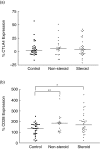Increased expression of plasma and cell surface co-stimulatory molecules CTLA-4, CD28 and CD86 in adult patients with allergic asthma
- PMID: 15958078
- PMCID: PMC1809415
- DOI: 10.1111/j.1365-2249.2005.02815.x
Increased expression of plasma and cell surface co-stimulatory molecules CTLA-4, CD28 and CD86 in adult patients with allergic asthma
Abstract
The co-stimulatory interactions of the B7 family molecules CD80 and CD86 on antigen-presenting cells, together with their T cell counter receptors CD28 and cytotoxic T lymphocyte-associated antigen-4 (CTLA-4), modulate T lymphocyte-mediated immune responses in a reciprocal manner. To investigate whether there is altered expression and the clinical significance of soluble co-stimulatory molecules in asthmatic patients, plasma concentrations of sCTLA-4, sCD28, sCD80 and sCD86 in 51 adult allergic asthmatic adults with or without steroid treatment, and 35 sex- and age-matched control subjects were measured by enzyme-linked immunosorbent assay (ELISA). Cell surface expression of CTLA-4 and CD28 on peripheral blood mononuclear cells (PBMC) were analysed by flow cytometry. Results showed that the plasma sCTLA-4 concentration was significantly higher in all asthmatic patients while sCD28 and sCD86 concentrations were significantly higher in steroid and non-steroid treated asthmatic patients, respectively, compared with control subjects (all P < 0.01). Significantly increased cell surface expression of CD28 but not CTLA-4 on PBMC was found in asthmatic patients compared with controls (P < 0.05). The plasma concentration and cell surface expression of CTLA-4 were found to exhibit positive and significant correlations with those of CD28 (both P < 0.05). Serum total IgE concentration correlated positively and significantly with sCTLA-4 and sCD28 concentrations in allergic asthmatic patients (both P < 0.05). The increased expression of these soluble co-stimulatory molecules may reflect the dysregulation of T cell activation, thereby contributing to the immunopathogenesis of allergic asthma.
Figures


Similar articles
-
Elevation of plasma soluble T cell costimulatory molecules CTLA-4, CD28 and CD80 in children with allergic asthma.Int Arch Allergy Immunol. 2005 May;137(1):45-52. doi: 10.1159/000084612. Epub 2005 Mar 21. Int Arch Allergy Immunol. 2005. PMID: 15785081
-
Plasma concentrations of soluble CTLA-4, CD28, CD80 and CD86 costimulatory molecules reflect disease severity of acute asthma in children.Pediatr Pulmonol. 2006 Jul;41(7):674-82. doi: 10.1002/ppul.20432. Pediatr Pulmonol. 2006. PMID: 16703581
-
Aberrant production of soluble costimulatory molecules CTLA-4, CD28, CD80 and CD86 in patients with systemic lupus erythematosus.Rheumatology (Oxford). 2005 Aug;44(8):989-94. doi: 10.1093/rheumatology/keh663. Epub 2005 May 3. Rheumatology (Oxford). 2005. PMID: 15870153
-
CD28/CTLA-4--CD80/CD86 and ICOS--B7RP-1 costimulatory pathway in bronchial asthma.Allergy. 2006 Jan;61(1):15-26. doi: 10.1111/j.1398-9995.2006.01008.x. Allergy. 2006. PMID: 16364152 Review.
-
The soluble CTLA-4 receptor: a new marker in autoimmune diseases.Arch Immunol Ther Exp (Warsz). 2005 Jul-Aug;53(4):336-41. Arch Immunol Ther Exp (Warsz). 2005. PMID: 16088318 Review.
Cited by
-
Biochemical analysis of CTLA-4 immunoreactive material from human blood.BMC Immunol. 2009 Sep 22;10:51. doi: 10.1186/1471-2172-10-51. BMC Immunol. 2009. PMID: 19772653 Free PMC article.
-
Bovine Holo-Beta-Lactoglobulin Cross-Protects Against Pollen Allergies in an Innate Manner in BALB/c Mice: Potential Model for the Farm Effect.Front Immunol. 2021 Mar 5;12:611474. doi: 10.3389/fimmu.2021.611474. eCollection 2021. Front Immunol. 2021. PMID: 33746954 Free PMC article.
-
Increased expression of plasma and CD4+ T lymphocyte costimulatory molecule CD26 in adult patients with allergic asthma.J Clin Immunol. 2007 Jul;27(4):430-7. doi: 10.1007/s10875-007-9093-z. Epub 2007 May 25. J Clin Immunol. 2007. PMID: 17525828
-
Effects of different up-dosing regimens for hymenoptera venom immunotherapy on serum CTLA-4 and IL-10.PLoS One. 2012;7(6):e37980. doi: 10.1371/journal.pone.0037980. Epub 2012 Jun 19. PLoS One. 2012. PMID: 22723841 Free PMC article.
-
Immune checkpoint molecules in prevention and development of asthma.Front Immunol. 2023 Feb 14;14:1070779. doi: 10.3389/fimmu.2023.1070779. eCollection 2023. Front Immunol. 2023. PMID: 36865540 Free PMC article. Review.
References
-
- Marone G. Asthma: recent advances. Immunol Today. 1998;19:5–9. - PubMed
-
- Larche M, Robinson DS, Kay AB. The role of T lymphocytes in the pathogenesis of asthma. J Allergy Clin Immunol. 2003;111:450–63. - PubMed
-
- Chambers CA, Allison JP. Co-stimulation in T cell responses. Curr Opin Immunol. 1997;9:396–404. - PubMed
-
- Greenfield EA, Nguyen KA, Kuchroo VK. CD28/B7 co-stimulation: a review. Crit Rev Immunol. 1998;18:389–418. - PubMed
Publication types
MeSH terms
Substances
LinkOut - more resources
Full Text Sources
Other Literature Sources
Medical

